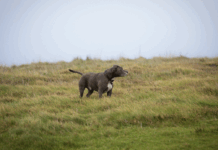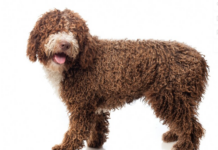Last Updated on February 21, 2023 by Dogs Vets
Goldendoodles: A Comprehensive Guide to Their Temperament, Health, and Hypoallergenic Qualities [+ Pros and Cons]
Welcome to our comprehensive guide to owning a Goldendoodle!
Goldendoodles are a popular breed for many reasons, but it’s important to understand the pros and cons before making the decision to bring one into your home.
In this guide, we’ll discuss the benefits and drawbacks of owning a Goldendoodle, and provide some helpful tips for taking care of your new furry friend.
What is a Goldendoodle?
A Goldendoodle is a mixed breed dog that is a cross between a Golden Retriever and a Poodle. They are known for their friendly, affectionate personalities and their low-shedding coats.
Are Goldendoodles A Good Breed?
Goldendoodles can be a wonderful breed for the right person or family.
As a cross between a Golden Retriever and a Poodle, Goldendoodles can inherit the best traits of both breeds, such as the loyalty and friendliness of a Golden Retriever, and the intelligence and hypoallergenic coat of a Poodle.
One of the main benefits of owning a Goldendoodle is their friendly and outgoing nature. They are typically great with children and other pets, and they love to be around people.
Goldendoodles are also known for being highly intelligent and trainable, which makes them a popular choice for service dog training.
In addition, Goldendoodles are often considered a hypoallergenic breed, as they tend to shed less than other breeds. This can be a major advantage for people who suffer from allergies, as it can make it easier for them to own a dog without experiencing uncomfortable symptoms.
However, there are also some potential drawbacks to owning a Goldendoodle.
Like any breed, Goldendoodles require a lot of care and attention, including regular grooming, exercise, and training. They can also be prone to certain health issues, such as hip dysplasia and ear infections, which can be costly to treat.
Overall, whether or not a Goldendoodle is a good breed for you will depend on your individual lifestyle and preferences.
If you are looking for a friendly, intelligent, and hypoallergenic dog that requires plenty of love and attention, a Goldendoodle may be the perfect choice for you.
Pros of Owning a Goldendoodle:
- Hypoallergenic: One of the biggest advantages of owning a Goldendoodle is that they are considered to be hypoallergenic. This means that they produce less dander than other breeds, making them a great option for those with allergies.
- Good with Children: Goldendoodles are known for being great with children. They are friendly, playful, and enjoy being around people. This makes them a wonderful addition to any family with young children.
- Intelligent: Goldendoodles are a mix between a Golden Retriever and a Poodle, which means that they are highly intelligent. They are easy to train, and can learn a variety of commands and tricks.
- Affectionate: Goldendoodles are also known for being very affectionate. They love to cuddle and be close to their owners, making them the perfect companion for those who want a loyal and loving pet.
Cons of Owning a Goldendoodle:
- High Energy: Goldendoodles are very active dogs, which means that they require a lot of exercise. They need to be walked regularly and given plenty of opportunities to run and play.
- Grooming Needs: Goldendoodles have a thick, curly coat that requires regular grooming. This includes brushing, trimming, and bathing.
- Expensive: Goldendoodles can be quite expensive, especially if you purchase one from a reputable breeder. They also require regular vet visits and high-quality food, which can add to the cost of ownership.
- Separation Anxiety: Goldendoodles are known for being very attached to their owners, which can lead to separation anxiety. This means that they may become anxious or destructive when left alone for long periods of time.
Taking Care of Your Goldendoodle:
- Exercise: As mentioned earlier, Goldendoodles require a lot of exercise. It’s important to provide them with plenty of opportunities to run and play. Daily walks and playtime in the backyard are great options.
- Grooming: Regular grooming is important to keep your Goldendoodle’s coat looking healthy and beautiful. This includes brushing, trimming, and bathing.
- Training: Goldendoodles are highly intelligent, which means that they are easy to train. Start training your puppy as soon as possible, and be consistent with your commands and expectations.
- Socialization: Goldendoodles are social dogs and enjoy being around people and other dogs. It’s important to socialize your puppy early on, and expose them to a variety of situations and people.
Family-Friendly
Goldendoodles are known to be a family-friendly dog breed, thanks to their affectionate and gentle nature. They are often great with children and can make excellent companions for families of all sizes.
As a crossbreed between a Golden Retriever and a Poodle, Goldendoodles inherit many of the best traits from both breeds. They are intelligent, social, and outgoing dogs that thrive in the company of their owners.
Goldendoodles are often described as loyal, friendly, and playful dogs that make wonderful additions to any family.
Their friendly nature also makes them great with other pets in the household, such as cats and other dogs.
Goldendoodles are typically easy to train, and they enjoy learning new tricks and commands. This makes them a great choice for families with young children who want a dog that can be trained to follow simple rules.
Goldendoodles are also known to be active dogs that love to play and explore. They need regular exercise to stay healthy and happy, so it’s important for their owners to make sure they get plenty of walks, runs, and playtime.
With their fun-loving personalities, Goldendoodles make great outdoor companions and can be a good fit for families that enjoy spending time outside.
Overall, Goldendoodles are a great choice for families looking for a friendly and affectionate dog that can provide plenty of love and companionship.
Minimal Shedding
If you’re looking for a dog that doesn’t shed much, there are several breeds to choose from.
While no dog is completely hypoallergenic, some breeds are known for having minimal shedding and may be a good choice for people with allergies or who don’t want a lot of pet hair in their homes.
Here are some of the most popular low-shedding dog breeds:
- Poodle – Poodles are known for their hypoallergenic coat, which doesn’t shed much and can be good for people with allergies. They come in a variety of sizes, from toy to standard, and are also highly intelligent and trainable.
- Bichon Frise – Bichons have a curly, hypoallergenic coat that doesn’t shed much. They are also friendly and affectionate, and make great companion dogs.
- Shih Tzu – Shih Tzus have a long, silky coat that doesn’t shed much, but does require regular grooming. They are known for being loyal and affectionate, and are good with children and other pets.
- Maltese – Maltese dogs have a long, white coat that doesn’t shed much, but does require regular grooming to prevent matting. They are also small and portable, which makes them a popular choice for apartment dwellers.
- Portuguese Water Dog – Portuguese Water Dogs have a curly, hypoallergenic coat that doesn’t shed much. They are also highly intelligent and trainable, and were originally bred to be working dogs.
- Basenji – Basenjis have a short, fine coat that doesn’t shed much. They are also known for their intelligence and independence, and are a good choice for people who want a low-maintenance dog.
When choosing a low-shedding dog breed, it’s important to keep in mind that all dogs require some amount of grooming and care to stay healthy and happy.
Regular brushing, bathing, and nail trimming are all important parts of owning a dog, regardless of their shedding level.
Goldendoodle Temperament
Temperament refers to a dog’s general personality traits and behaviors. It’s an important factor to consider when choosing a dog, as it can have a big impact on your experience as an owner.
Some dog breeds are known for having certain temperaments, which can make them more or less suitable for different types of households.
For example, some breeds are known for being friendly and outgoing, while others are more independent or reserved.
When considering a dog’s temperament, there are a few key traits to look for:
- Friendliness: A friendly dog is generally outgoing and sociable, and enjoys being around people and other pets.
- Trainability: Dogs that are easy to train tend to be intelligent and responsive, which can make them easier to manage and live with.
- Energy level: Some dogs are high-energy and require a lot of exercise and playtime, while others are more laid-back and don’t require as much activity.
- Adaptability: A dog’s adaptability refers to how well they can adjust to different living situations and environments.
- Tolerance: A dog’s tolerance refers to how well they can handle different types of stimuli, such as loud noises or unfamiliar people and animals.
- Aggression: Some dogs are more prone to aggression than others, which can make them a challenge to live with and manage.
When choosing a dog, it’s important to consider all of these factors and how they fit with your individual lifestyle and preferences.
Talking to a breeder or rescue organization can also be helpful, as they can provide more information about a particular dog’s temperament and needs.
Goldendoodles are a hybrid breed that combines the traits of a Golden Retriever and a Poodle. As a result, their temperament can vary depending on their genetic makeup and individual personality.
Overall, Goldendoodles are known for being friendly, affectionate, and social dogs. They typically love being around people and other pets, and are often described as loyal and devoted companions.
Because of their friendly nature, Goldendoodles can make great family pets and are generally good with children.
Goldendoodles are also highly trainable and intelligent, which can make them easy to manage and live with. They are often used as therapy dogs, service dogs, and in other working roles because of their high trainability and desire to please their owners.
In terms of energy level, Goldendoodles can vary depending on their individual genetic makeup.
Some Goldendoodles are high-energy and require a lot of exercise and playtime, while others are more laid-back and don’t require as much activity.
It’s important to consider the energy level of a particular Goldendoodle when choosing a dog, as it can have a big impact on your experience as an owner.
Goldendoodles are generally known for being low-shedding, which can make them a good choice for people with allergies or who don’t want a lot of pet hair in their homes.
However, it’s important to keep in mind that all dogs require some amount of grooming and care to stay healthy and happy, regardless of their shedding level.
Overall, Goldendoodles have a friendly and social temperament that can make them great companions for a variety of households.
However, it’s important to do your research and choose a reputable breeder or rescue organization to ensure that you get a Goldendoodle with a temperament that fits your individual lifestyle and preferences.
Goldendoodles Hypoallergenic Qualities
Goldendoodles are often considered to be hypoallergenic, which means that they are less likely to cause allergic reactions in people who are sensitive to pet dander or other allergens. This is because they have hair instead of fur, and they shed less than other dog breeds.
However, it’s important to note that no dog breed is completely hypoallergenic, and different individuals may react differently to different dogs.
Some people may still experience allergic reactions to Goldendoodles, particularly if they have severe allergies.
If you are considering a Goldendoodle because of their hypoallergenic qualities, it’s important to spend time around them to see how you react before bringing one into your home.
You may also want to talk to an allergist to get a better understanding of your individual allergy triggers and how they may be affected by a Goldendoodle.
In addition to their low-shedding coat, Goldendoodles can also benefit from regular grooming and care to help reduce allergens in your home. This can include regular baths, brushing, and cleaning of their ears and teeth to keep them healthy and happy.
Overall, while Goldendoodles may be a good choice for people with allergies, it’s important to do your research and understand that no dog breed is completely hypoallergenic.
By spending time around Goldendoodles and working with your doctor or allergist, you can make an informed decision about whether a Goldendoodle is right for you and your family.
Trainability
Goldendoodles are known for their intelligence and trainability, making them relatively easy to train.
As a hybrid breed, they inherit traits from both the Golden Retriever and the Poodle, two breeds that are known for being highly trainable and responsive to positive reinforcement training methods.
Goldendoodles are often used as therapy dogs, service dogs, and in other working roles because of their trainability and willingness to please their owners.
Goldendoodles can learn a variety of commands and tricks with consistent training and positive reinforcement, and often excel in activities such as obedience training, agility, and even hunting.
In addition to their natural intelligence and trainability, Goldendoodles also tend to have a good temperament for training. They are typically friendly, social dogs that enjoy interacting with people and other pets, which can make training more enjoyable for both the owner and the dog.
As with any dog breed, the key to successfully training a Goldendoodle is to use positive reinforcement techniques, such as rewards and praise, and to be patient and consistent in your training efforts.
It’s also important to provide plenty of socialization and opportunities for exercise and play, as these can help keep your Goldendoodle happy, healthy, and well-behaved.
Overall, Goldendoodles are generally considered to be an easy-to-train breed that responds well to positive reinforcement training methods.
With consistent training, socialization, and exercise, Goldendoodles can become well-behaved and well-trained companions for a variety of households.
Grooming Requirements
Goldendoodles have a coat that requires regular grooming to keep them healthy and looking their best. Their coat is typically long, wavy, and may be curly, which means it can easily become tangled or matted if not properly cared for.
To keep your Goldendoodle’s coat in good condition, it’s recommended that you brush them at least once a week to prevent tangles and matting. This can also help remove loose fur and dirt, which can help reduce shedding and keep your home cleaner.
In addition to regular brushing, Goldendoodles will also need to be bathed on occasion to keep their coat clean and healthy.
However, it’s important not to bathe them too frequently, as this can strip their coat of its natural oils and cause skin irritation.
As a general rule, it’s recommended that you bathe your Goldendoodle every 6-8 weeks or as needed based on their activity level and overall cleanliness.
Goldendoodles will also need to have their nails trimmed regularly to prevent them from becoming too long or causing discomfort. This is typically done every 2-3 months, although the frequency may vary depending on the dog’s activity level and the type of surfaces they walk on.
Finally, Goldendoodles will also need to have their ears and teeth cleaned on a regular basis to keep them healthy and free of infection. This can be done at home using specialized cleaning products or by a professional groomer or veterinarian.
Overall, Goldendoodles require regular grooming to keep their coat, nails, ears, and teeth healthy and clean.
By providing them with proper care and grooming, you can help keep your Goldendoodle looking and feeling their best, and also reduce the risk of health problems associated with poor grooming habits.
Goldendoodles Destructive Behavior
Goldendoodles, like any other breed, can exhibit destructive behavior if they are not properly trained or if their needs are not being met.
Destructive behavior can include chewing, digging, scratching, or other behaviors that can damage property or pose a danger to the dog or others in the household.
One of the most common reasons that Goldendoodles exhibit destructive behavior is due to boredom or lack of exercise.
These dogs are active and intelligent, and need plenty of opportunities to engage in physical and mental stimulation.
Without adequate exercise and mental stimulation, Goldendoodles may become restless, anxious, or bored, which can lead to destructive behavior.
Another reason that Goldendoodles may exhibit destructive behavior is due to separation anxiety.
These dogs are social and affectionate, and may become anxious or distressed when left alone for extended periods of time.
This can manifest as destructive behavior, as the dog may attempt to escape or engage in destructive activities in an effort to alleviate their anxiety.
To prevent destructive behavior in Goldendoodles, it’s important to provide them with plenty of exercise, mental stimulation, and socialization. This can include daily walks or runs, interactive toys, and training or obedience classes to help keep their minds engaged.
It’s also important to provide Goldendoodles with plenty of socialization and attention, especially during the early stages of their life.
This can help prevent separation anxiety and other behavioral issues, and also help strengthen the bond between the dog and their owner.
If your Goldendoodle is exhibiting destructive behavior, it’s important to address the issue as soon as possible.
This may involve consulting with a professional dog trainer or behaviorist to develop a behavior modification plan, or making changes to your dog’s environment or routine to better meet their needs.
With patience, consistency, and proper training, Goldendoodles can learn to overcome destructive behavior and become well-behaved and happy companions.
Goldendoodles Health
Goldendoodles are generally considered a healthy breed, but like all dogs, they may be susceptible to certain health conditions.
As a hybrid dog breed, Goldendoodles can inherit health issues from their parent breeds, which are typically Golden Retrievers and Poodles.
One health concern that is common in larger dog breeds,
including some Goldendoodles, is hip dysplasia.
This is a genetic condition in which the hip joint does not form properly, leading to discomfort and arthritis over time. Regular exercise, a healthy diet, and weight management can help reduce the risk of hip dysplasia.
Goldendoodles may also be prone to ear infections, which can be caused by the floppy ears that many of them inherit from their Golden Retriever parent.
Regular cleaning and inspection of the ears can help prevent infections from developing.
Some Goldendoodles may also be susceptible to skin allergies or other skin conditions,
which can cause itching, redness, and discomfort.
These conditions may be caused by environmental allergens or other factors, and may require medical treatment or dietary changes to manage.
It’s important to work with a reputable breeder and schedule regular check-ups with a veterinarian to help ensure that your Goldendoodle is healthy and well-cared for.
In addition to routine care, there are several steps that owners can take to promote the health and well-being of their Goldendoodle, including regular exercise, a healthy diet, and proper grooming and hygiene practices.
By providing proper care and attention, Goldendoodles can live long, healthy, and happy lives as beloved family pets.
Not For Apartment Living
Goldendoodles are generally active dogs that require plenty of exercise and playtime, which can make them less suitable for apartment living.
While some Goldendoodles may adapt well to smaller living spaces, they generally do best in homes with ample room to run and play.
Because of their high energy levels, Goldendoodles need plenty of space to move around and explore. They also benefit from daily exercise and playtime, which can help keep them mentally and physically stimulated.
This may be difficult to achieve in an apartment setting, where outdoor space may be limited and noise restrictions may apply.
In addition to space and exercise requirements, Goldendoodles may also be prone to barking or other noisy behaviors, which can be a concern for apartment dwellers.
While training and socialization can help curb unwanted behaviors, it’s important to consider these factors when deciding whether a Goldendoodle is a good fit for apartment living.
Ultimately, the decision of whether to keep a Goldendoodle in an apartment should be based on the individual needs and temperament of the dog, as well as the owner’s ability to provide the necessary care and attention.
If you are considering a Goldendoodle for apartment living, it’s important to consult with a veterinarian or professional dog trainer to assess your pet’s needs and determine the best course of action.
Sensitive Digestion
Goldendoodles may be prone to sensitive digestion, which can cause discomfort, digestive upset, and other health issues. This sensitivity can be caused by a variety of factors, including food intolerances, digestive disorders, or other underlying health conditions.
One way to address sensitive digestion in Goldendoodles is to choose a high-quality, nutrient-dense diet that is tailored to their specific nutritional needs.
This may involve working with a veterinarian or animal nutritionist to select a diet that is appropriate for their age, weight, and other health concerns.
In addition to dietary changes, there are several other steps that owners can take to promote healthy digestion in Goldendoodles.
These may include regular exercise, proper hydration, and the use of digestive supplements or probiotics to support gut health.
It’s also important to monitor your Goldendoodle’s digestion and eliminate any potential triggers, such as table scraps, human foods, or other foods that may be difficult to digest.
By taking a proactive approach to digestive health, owners can help their Goldendoodles lead healthy, comfortable lives and avoid many of the digestive issues that can arise in this breed.
If you suspect that your Goldendoodle is experiencing digestive issues, it’s important to consult with a veterinarian to identify the underlying cause and develop an appropriate treatment plan.
With the right care and attention, Goldendoodles with sensitive digestion can live long, healthy, and happy lives as beloved family pets.
Goldendoodles Skin Allergies
Like many breeds, Goldendoodles may be prone to skin allergies, which can cause itching, redness, inflammation, and other uncomfortable symptoms.
These allergies can be caused by a variety of environmental or dietary factors, and can be challenging to manage without proper care and attention.
One of the most common causes of skin allergies in Goldendoodles is food allergies or intolerances. These may be triggered by certain ingredients in your pet’s food, such as grains, dairy, or meat proteins.
If you suspect that your Goldendoodle is suffering from a food allergy, you may need to work with a veterinarian or animal nutritionist to identify the allergen and develop an appropriate dietary plan.
There are several other steps that owners can take to help manage skin allergies in Goldendoodles.
These may include regular grooming and bathing to keep the skin clean and free of irritants, using hypoallergenic shampoos or other grooming products, and avoiding exposure to common allergens such as pollen, dust mites, or other environmental triggers.
If your Goldendoodle is experiencing skin allergies, it’s important to seek veterinary care to identify the underlying cause and develop an appropriate treatment plan.
This may involve the use of topical or oral medications to reduce inflammation and discomfort, as well as ongoing management and monitoring to prevent future flare-ups.
With proper care and attention, it is possible to manage skin allergies in Goldendoodles and help your pet live a healthy, comfortable, and happy life as a beloved member of your family.
Congenital Defects
Like all dog breeds, Goldendoodles can be prone to certain congenital defects, which are present from birth and can impact the dog’s health and well-being over time.
Some of the most common congenital defects in Goldendoodles include hip dysplasia, elbow dysplasia, and eye disorders such as progressive retinal atrophy.
Hip dysplasia is a genetic condition that can cause the hip joint to form improperly, leading to pain, inflammation, and difficulty with mobility. This condition is more common in larger dog breeds like Goldendoodles, and can be managed through careful breeding practices and regular veterinary care.
Elbow dysplasia is a similar condition that affects the elbow joint, and can also cause discomfort and mobility issues over time. This condition can be managed through regular exercise, a healthy diet, and proper veterinary care, including regular check-ups and X-rays to monitor joint health.
Eye disorders such as progressive retinal atrophy (PRA) can also impact the health and well-being of Goldendoodles. PRA is a degenerative condition that can cause vision loss and blindness over time, and can be difficult to detect in its early stages.
Regular eye exams and monitoring can help detect PRA and other eye disorders early, allowing for prompt and effective treatment.
Other congenital defects that may impact Goldendoodles include heart conditions, neurological disorders, and certain types of cancer. These conditions can be managed through careful breeding practices, regular veterinary care, and early detection and treatment of potential health issues.
If you are considering adding a Goldendoodle to your family, it’s important to work with a reputable breeder who conducts health screenings and genetic testing to minimize the risk of congenital defects.
Regular veterinary care and monitoring can also help ensure that any health issues are detected and treated early, allowing your Goldendoodle to live a healthy, happy, and active life as a cherished member of your family.
In conclusion, owning a Goldendoodle can be a wonderful experience for those who are prepared for the responsibilities that come with it. While they have some drawbacks, the benefits of owning a Goldendoodle far outweigh the negatives.
If you’re looking for a loyal, affectionate, and playful pet, then a Goldendoodle may be the perfect addition to your family.
Remember to provide them with plenty of exercise, grooming, and training, as well as socialization opportunities. With the proper care and attention, your Goldendoodle can be a loyal and loving companion for many years to come.
We hope this guide has been helpful in providing you with a comprehensive overview of the pros and cons of owning a Goldendoodle.
By following our tips for taking care of your new furry friend, you can enjoy all the benefits of owning this wonderful breed.
If you have any questions or concerns, don’t hesitate to reach out to a reputable breeder or veterinarian for advice. Thank you for reading, and best of luck with your new Goldendoodle!
Important Questions About Goldendoodle
- Are Goldendoodles hypoallergenic?
Goldendoodles are often considered to be hypoallergenic, meaning that they are less likely to cause allergies in people who are sensitive to dog dander. However, this can vary from dog to dog, and some Goldendoodles may still cause allergies in some people.
- Are Goldendoodles good with kids?
Goldendoodles are known for being friendly and gentle with children, making them a great choice for families with kids. However, as with any dog, it’s important to supervise interactions between children and dogs to ensure that both are safe and happy.
- Do Goldendoodles require a lot of grooming?
Goldendoodles have low-shedding coats that require regular grooming to prevent matting and tangling. This may involve brushing their coat daily or every few days, as well as occasional trips to a professional groomer for a trim.
- Are Goldendoodles easy to train?
Goldendoodles are highly intelligent and eager to please, which can make them relatively easy to train. However, like any dog, they require consistent and patient training to learn new commands and behaviors.
- Do Goldendoodles have any health issues?
Like all dog breeds, Goldendoodles can be prone to certain health issues, such as hip dysplasia, elbow dysplasia, and eye disorders. It’s important to work with a reputable breeder who conducts health screenings and genetic testing to minimize the risk of these issues.
- Are Goldendoodles good apartment dogs?
Goldendoodles are active dogs that require regular exercise and playtime, so they may not be the best choice for apartment living. However, with enough daily exercise and attention, they can adapt to living in smaller spaces.
Facts Check
We hope you enjoyed this article… What are your thoughts?
Pls feel free to share this article!
![Goldendoodles: A Comprehensive Guide [+ Pros and Cons] Goldendoodles: A Comprehensive Guide [+ Pros and Cons]](https://dogsvets.com/wp-content/uploads/2023/02/Screen-Shot-2023-02-20-at-6.38.48-AM-696x402.png)






















